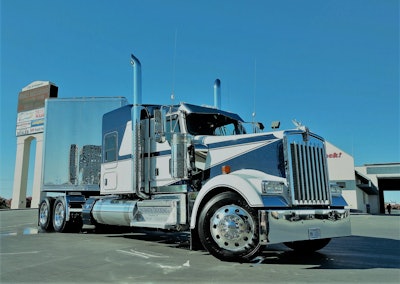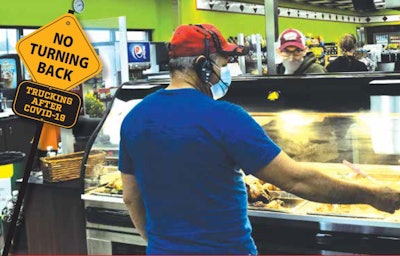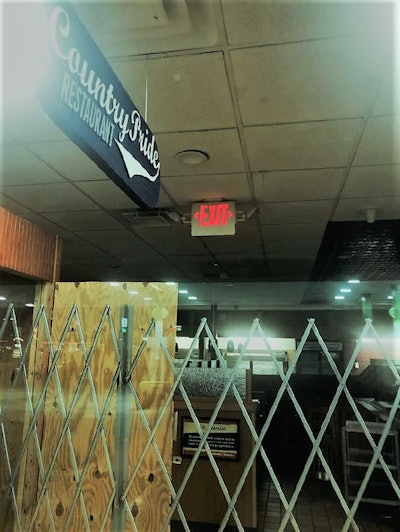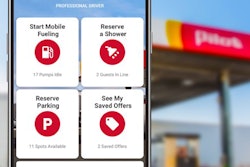Lincolnton, North Carolina-based owner-operator Erick Engbarth recently pulled into a truck stop and had to make a beeline for the bathroom. The stop was requiring masks, as have many national chains and independents, some because of state orders. Engbarth neglected to don his, and the fuel desk clerk reprimanded him.
 Engbarth’s 2020 custom KW
Engbarth’s 2020 custom KWHe noticed that one of the clerks wasn’t wearing a mask and that the other had hers around her chin.
“You need to put yours on,” he responded, and “It looks like she needs to learn how to wear hers.”
As the COVID-19 pandemic drags on, such behavioral fatigue is not uncommon. While mask mandates might disappear when a vaccine becomes widely available, other services and practices at truck stops that have changed or accelerated with the pandemic may well expand.
Much of the change relates to food service — sanitation practices broadly speaking (with application throughout stores in other areas, of course) and how food is delivered. Other changes concern converting common truck stop transactions to app-based procedures that minimize face-to-face interactions.
 The deli at White’s Travel Center in Raphine, Virginia, has seen a huge increase in business as dine-in options were limited by state mandate through the pandemic, said owner Bobby Berkstresser. The mandate accelerated an existing trend in dining preferences, at once, as also happened in access to telehealth services reported last month in the previous part in this series.
The deli at White’s Travel Center in Raphine, Virginia, has seen a huge increase in business as dine-in options were limited by state mandate through the pandemic, said owner Bobby Berkstresser. The mandate accelerated an existing trend in dining preferences, at once, as also happened in access to telehealth services reported last month in the previous part in this series.“You can’t let up, especially now,” when it comes to accommodating new realities, said Bobby Berkstresser, owner of White’s Travel Center on I-81. The truck stop in Raphine, Virginia, is celebrated as the largest on the East Coast with 800-plus parking spaces.

At what already was known among drivers as a clean well-tended truck stop, living up to new sanitation standards is an ongoing challenge at White’s. As any truck stop operator knows, to fall obviously short would risk losing business.
“Every time we wipe a table, I can smell the disinfectant” amid socially distanced seating (every other table available, as required by the state), Berkstresser said. “And hey, it really smells good to me now.”
Berkstresser and others in the truck stop community feel the bar has been raised for protection during the pandemic, and new practices related to food and other services, such as showers, are unlikely to fully revert to the way things were beforehand.
Sanitation measures and fewer spaced-out dining tables are one thing, but they don’t compare to what Bryan Hutchens said was a positively “haunting sight for drivers.”
That’s how he described a photo he took of a blocked entrance to the closed Country Pride restaurant at the Antioch TravelCenters of America location in metro Nashville, Tennessee.
 Hutchens’ photo showed the principal sit-down dining option at the TA Antioch in metro Nashville, Tenn., remained closed as of early October. TA-Petro hosts this web page where it offers customers status updates on its restaurants at stops around the country, listing 66 restaurants as closed as of October 21. (Users of the Truck Smart app can find more current status there.) Spokesperson Tina Arundel reported more than a dozen reopenings planned for the near future though also noted “we don’t have a timetable for the reopening of the Country Pride in Antioch. However, we do have a Popeye’s and Burger King that offer meal options to our guests” there.
Hutchens’ photo showed the principal sit-down dining option at the TA Antioch in metro Nashville, Tenn., remained closed as of early October. TA-Petro hosts this web page where it offers customers status updates on its restaurants at stops around the country, listing 66 restaurants as closed as of October 21. (Users of the Truck Smart app can find more current status there.) Spokesperson Tina Arundel reported more than a dozen reopenings planned for the near future though also noted “we don’t have a timetable for the reopening of the Country Pride in Antioch. However, we do have a Popeye’s and Burger King that offer meal options to our guests” there.Even before the pandemic, in the wake of the electronic logging device mandate, Hutchens had witnessed what he believed to be a turn by many truck stops away from sit-down restaurants. The more rigid accountability regarding hours of service left drivers less time for a leisurely meal.
Of the many restaurants that remained, few seemed to stay open for 24/7 dine-in service. “ELDs had already hurt” access to such service for overnight haulers, Hutchens said, and then “COVID put the nail in the coffin.” For those that closed, “I don’t know if they’re ever going to open back up.”
For the near-term for some, Lisa Mullings, president of the truck stop trade group NATSO, isn’t so sure, either.
“Our members who are offering boxed meals with the grab-and-go food concepts are doing really well,” she said. In some cases, those concepts may have replaced the restaurant’s operations, partly in response to customer needs as so many look for ways to limit in-store time.
“That could be why you’re seeing some of them not reopening,” she said. “It just may not make sense financially.”
Local capacity restrictions on dine-in service also may contribute to an unprofitable outlook for reviving or maintaining full service. When Hutchens photographed the closed Country Pride in Nashville, the area had entered Phase 3 of its long-in-process reopening plan, allowing restaurants to run at 50% capacity for dine-in with social distancing. Yet the restaurant remained closed.
The Iron Skillet at White’s Travel Center was open the day of Overdrive’s October visit — minus its buffet. It also showed significant reductions from full capacity, as did the seating area of the mall-style food court with faster food options.
The Iron Skillet’s salad bar was open. State regulations require furnishing “deli tissues and plastic gloves” with such a bar, Berkstresser pointed out. “All utensils have to be changed every hour, and you have to document it.”
About mid-afternoon on a weekday at the stop, only a couple tables were occupied, but White’s deli counter was busy. Berkstresser said the deli had boomed in recent months, accelerating growth that had begun in earnest around the time of the ELD mandate. “That driver wants to come in here and get a meal and be gone,” he said. “It’s incredible the amount of food that goes out of this deli.”
In the deli’s six years, the stop has more than once added new equipment. “We package our own salads, beef and pork ribs, baked and fried chicken, hickory-smoked turkey legs, beef and pork barbecue,” Berkstresser said. “Cobbler, six vegetables. A rotation of chicken tenders, catfish and other things.”
Next in this series: Continuing proliferation of self-serve mobile tech reducing in-person contact at truck stops










